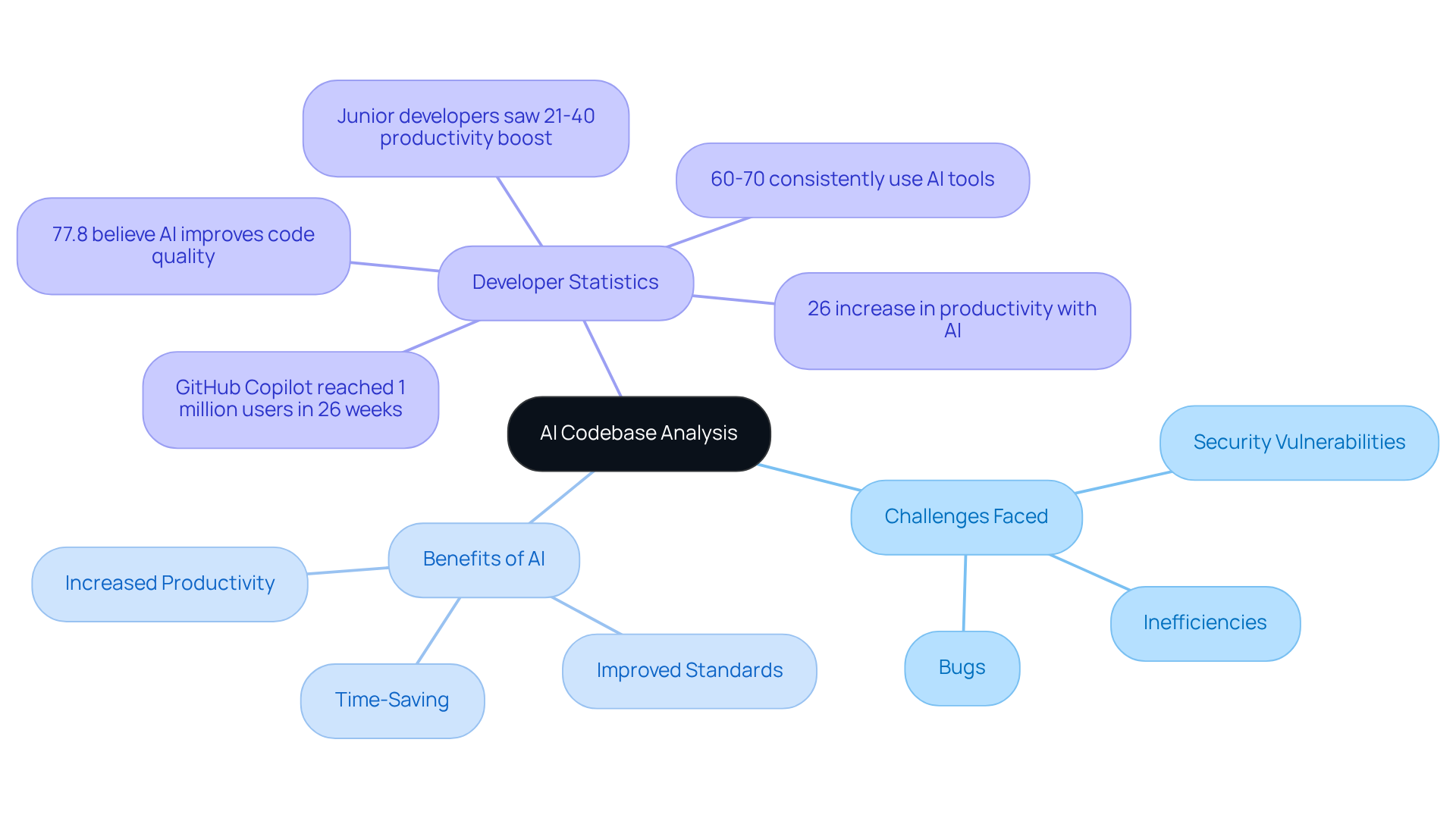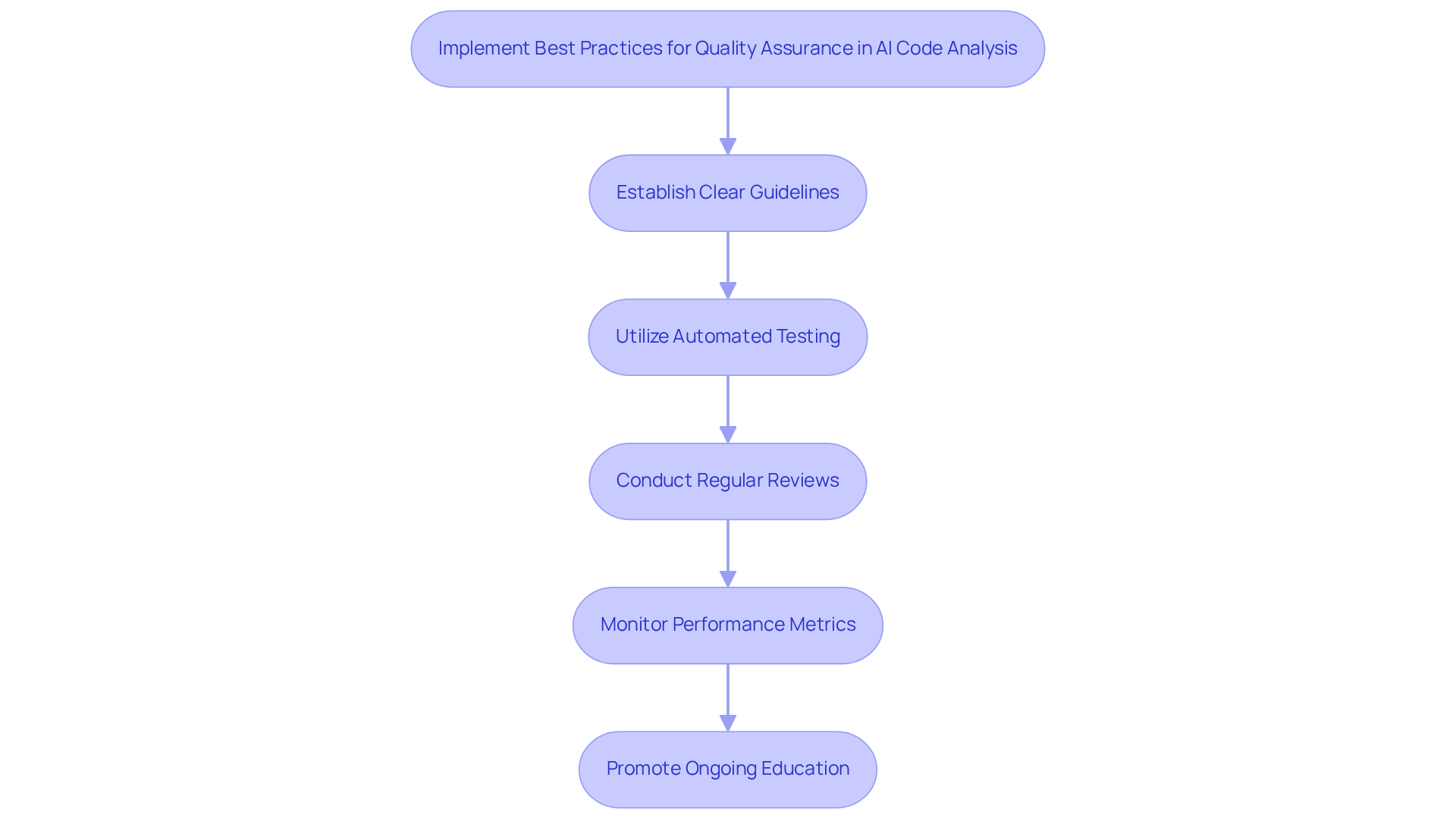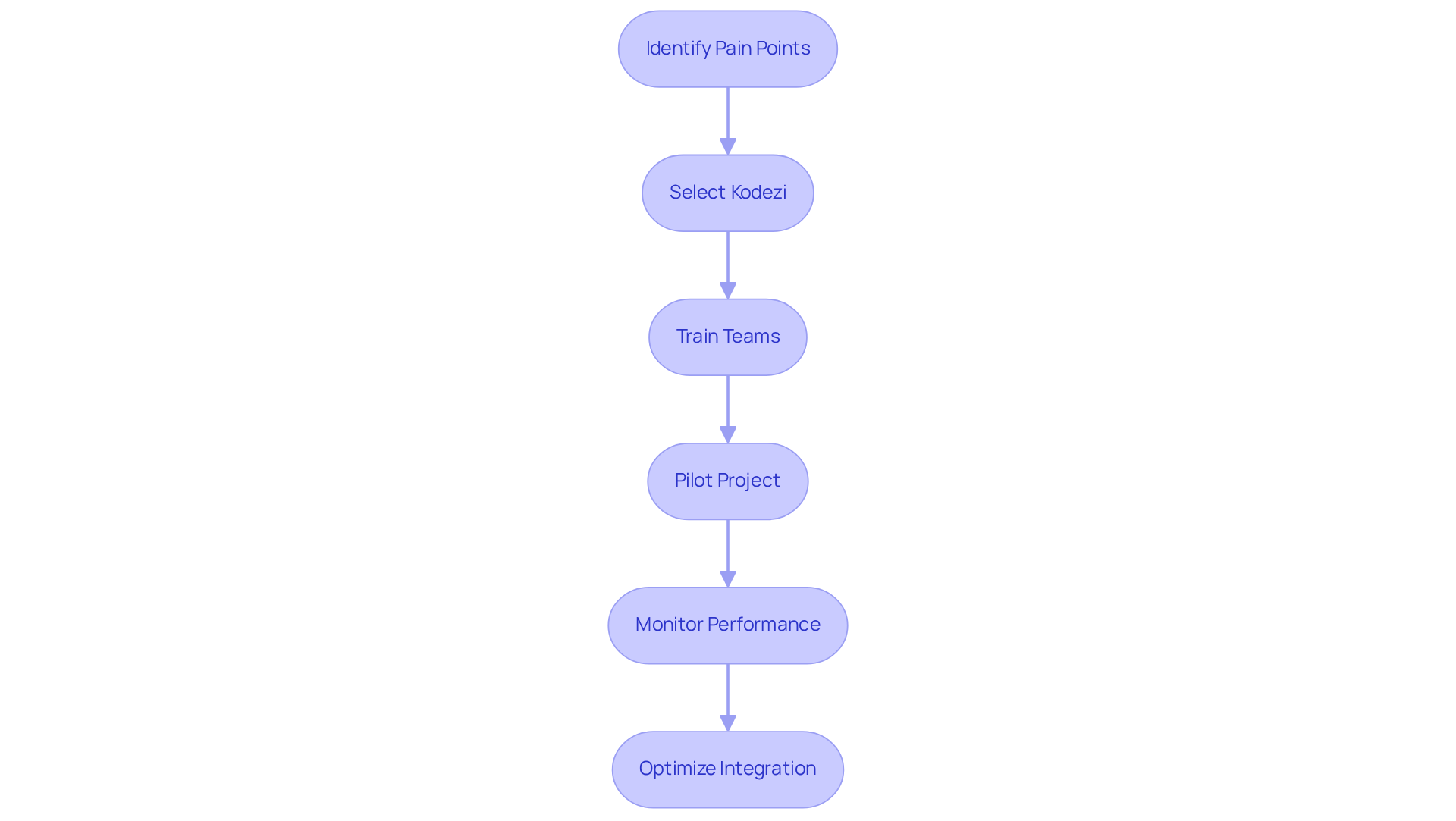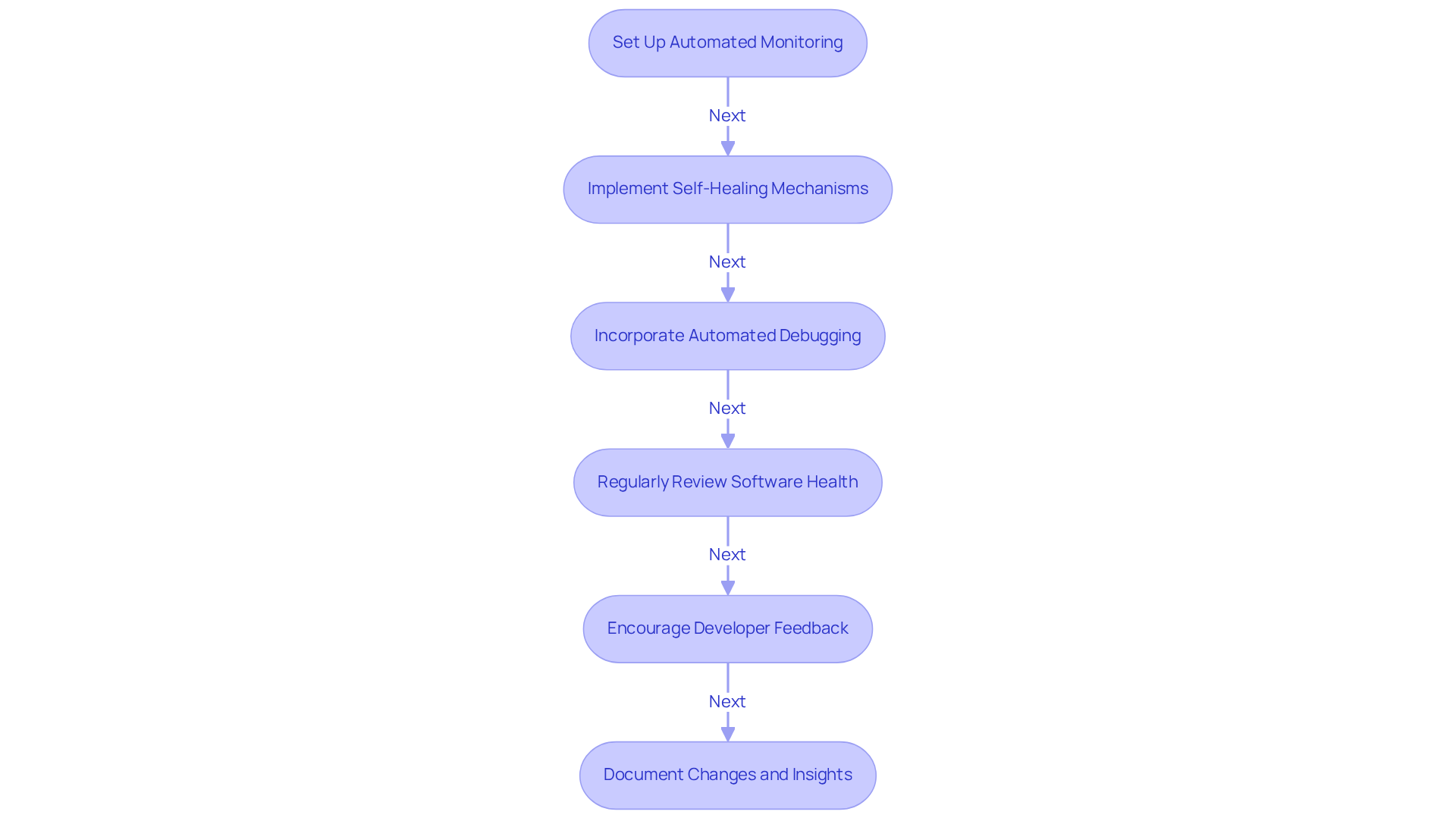Overview
The article begins by addressing the significant coding challenges developers encounter in their daily work. These challenges often hinder productivity and code quality.
In response, Kodezi offers a suite of AI-driven tools designed to tackle these issues head-on. With features that automate routine tasks, provide consistent oversight, and deliver actionable insights, Kodezi stands out as a valuable asset for developers.
By utilizing Kodezi, developers can expect not only enhanced programming standards but also a notable increase in their productivity. Imagine being able to focus more on creative problem-solving rather than getting bogged down by repetitive tasks.
Are you ready to elevate your coding practices? Explore the tools available on the Kodezi platform and discover how they can transform your development experience.
Introduction
In the fast-paced realm of software development, developers face significant challenges in achieving optimal code quality and efficiency. How can they overcome these hurdles? Enter Kodezi, a powerful tool designed to streamline workflows and elevate coding standards. By leveraging AI codebase analysis, Kodezi empowers developers to enhance their productivity and ensure high-quality code.
As organizations increasingly embrace these innovative technologies, the question arises: how can teams effectively integrate AI into their development processes? This article explores the transformative potential of AI codebase analysis, offering best practices and strategies that can elevate programming standards and drive productivity to new heights.
Understand AI Codebase Analysis and Its Importance
In the realm of software development, coding challenges are ever-present. Developers often face issues such as bugs, security vulnerabilities, and inefficiencies that can be difficult to identify. AI codebase analysis utilizes machine learning algorithms and data-informed methods to systematically assess and enhance software standards. This process is crucial for addressing these potential issues that may elude even the most diligent developers. By automating the AI codebase analysis, teams conserve time and resources while ensuring compliance with best practices and standards. Notably, 77.8% of programmers believe that AI code generators positively impact code quality by reducing human errors and enforcing coding standards. Additionally, a significant 60-70% of developers consistently utilize AI resources, underscoring the extensive adoption and confidence in these technologies.
Furthermore, AI systems provide consistent oversight of codebases, delivering immediate feedback and insights that empower developers to uphold high-quality standards throughout the development lifecycle. This proactive strategy is essential in today’s dynamic development environments, where codebases are increasingly complex. For instance, developers using AI coding assistants report a remarkable 26% increase in productivity, highlighting the tangible benefits of integrating AI into coding practices.
Recent advancements in AI codebase analysis tools have significantly enhanced their capabilities, enabling them to offer intelligent recommendations and automate routine tasks. As organizations progressively embrace these technologies, the potential for improved programming standards and efficiency becomes a strategic necessity for maintaining a competitive edge in software development. In light of these insights, are you ready to explore the tools that can elevate your coding practices?

Implement Best Practices for Quality Assurance in AI Code Analysis
To implement best practices for quality assurance in AI codebase analysis, teams face significant challenges in ensuring coding standards and software quality. How can organizations effectively navigate these complexities? By considering the following strategies, teams can enhance their approach to AI codebase analysis and quality assurance.
-
Establish Clear Guidelines: It is essential to define what constitutes quality programming within your organization. This includes coding standards, documentation requirements, and testing protocols that provide a foundation for excellence.
-
Utilize Automated Testing: By applying AI codebase analysis with AI-driven testing solutions, such as CLI services, you can autonomously enhance your codebase and resolve issues before they reach production. This proactive approach guarantees that alterations do not introduce new bugs, ultimately leading to more reliable software.
-
Conduct regular reviews using AI codebase analysis, as it can offer consistent and impartial feedback on programming standards and adherence to guidelines. This practice not only helps maintain quality but also fosters a culture of continuous improvement.
-
Monitor Performance Metrics: By regularly performing AI codebase analysis, teams can evaluate the effect of AI resources on software standards and pinpoint areas for enhancement. This data-driven approach empowers teams to make informed decisions about their coding practices.
-
Promote Ongoing Education: Cultivating an environment of learning where developers can exchange insights and experiences concerning AI resources, including Kodezi CLI, is vital. This collaboration enhances understanding and effectiveness in preserving software quality.
In conclusion, implementing these strategies can significantly improve productivity and code quality. Explore the tools available on the Kodezi platform to see how they can transform your coding practices.

Integrate AI Tools into Development Workflows for Enhanced Efficiency
In today's fast-paced development landscape, developers often grapple with repetitive tasks that hinder productivity. How can these challenges be effectively addressed? Enter Kodezi, a powerful AI tool designed to streamline workflows and enhance coding efficiency.
Kodezi tackles common pain points by automating tasks such as:
- AI codebase analysis
- Code reviews
- Testing
With 62% of developers leveraging AI to learn new programming languages, the importance of selecting the right tools cannot be overstated. Kodezi's command-line interface, for example, can repair codebases in seconds, significantly boosting productivity. Moreover, the platform offers free trials and demonstrations, allowing teams to explore its features before fully committing.
Training is crucial for maximizing the benefits of Kodezi. By providing sessions that highlight the advantages and best practices of the platform, teams can enhance their coding skills and understanding of the tools at their disposal. Expert insights affirm that integrating AI into workflows is vital for fostering innovation and reliability.
To ensure a smooth transition, consider implementing Kodezi gradually. Start with a pilot project to assess its integration and gather feedback. The ANZ Bank's trial with GitHub Copilot, which resulted in a 42.36% reduction in task completion time, illustrates the potential advantages of this approach. Similarly, Kodezi simplifies processes, allowing teams to focus on more complex challenges.
Continuous monitoring and optimization of AI tools through AI codebase analysis are essential. By regularly evaluating Kodezi's performance, teams can make necessary adjustments to enhance effectiveness and adapt to evolving needs. Organizations utilizing generative AI coding assistants have reported a 55% average increase in developer productivity, underscoring the positive impact of effective integration. KodeziChat further facilitates rapid resolution of coding questions, boosting team efficiency.
By following these steps and utilizing Kodezi's resources, including its complimentary trials and demonstrations, teams can automate repetitive tasks, leading to improved programming standards and enhanced overall efficiency in software development.

Maintain Code Quality Through Continuous Monitoring and Automated Maintenance
Maintaining code quality is a challenge that developers frequently encounter, necessitating a proactive approach that includes continuous monitoring and automated maintenance. Kodezi offers effective solutions to these challenges through its innovative features. Here are key strategies to implement:
- Set Up Automated Monitoring: Utilize the CLI to continuously monitor codebases for anomalies, performance issues, and security vulnerabilities, providing alerts when problems arise.
- Implement Self-Healing Mechanisms: Utilize ai codebase analysis to leverage AI capabilities for automatically resolving identified issues, such as rewriting unreliable tests or correcting bugs, significantly easing the burden on developers and enhancing programming productivity.
- Incorporate Automated Debugging: Take advantage of the CLI's automated debugging feature to swiftly identify and resolve programming issues, ensuring rapid issue resolution and enhanced standards.
- Regularly Review Software Health: Schedule periodic evaluations of program quality using CLI tools for ai codebase analysis, focusing on complexity and adherence to standards, ensuring that the software base remains maintainable and compliant with the latest security best practices.
- Encourage Developer Feedback: Foster an environment where developers can provide input on the effectiveness of the CLI and suggest enhancements, ensuring that the tools evolve alongside the team's needs.
- Document Changes and Insights: Maintain thorough documentation of code changes and insights gained from Kodezi's automated monitoring, creating a knowledge base that can inform future development efforts.
By implementing these strategies, you can significantly enhance your coding practices. Are you ready to explore the tools available on the Kodezi platform to improve your productivity and code quality?

Conclusion
AI codebase analysis addresses the significant challenges developers face in software development, such as bugs and inefficiencies. By leveraging machine learning and automation, organizations can enhance code quality and streamline workflows, ensuring that coding standards are not only met but exceeded. The integration of AI tools like Kodezi highlights the necessity of adopting innovative solutions to maintain a competitive edge in an increasingly complex coding environment.
Key insights emphasize the importance of:
- Establishing clear guidelines
- Utilizing automated testing
- Promoting continuous education among developers
These strategies foster a culture of quality assurance essential for navigating the complexities of modern software development. Furthermore, the benefits of AI tools, such as improved productivity and reduced task completion times, illustrate the tangible advantages of incorporating these technologies into development practices.
Ultimately, embracing AI codebase analysis and its associated best practices is a strategic imperative for organizations aiming to enhance their coding standards and efficiency. As the landscape of software development continues to evolve, leveraging these tools will be crucial in fostering innovation and achieving long-term success. It is time to explore the potential of AI resources and commit to a future where code quality and efficiency are paramount.
Frequently Asked Questions
What is AI codebase analysis?
AI codebase analysis is the use of machine learning algorithms and data-informed methods to systematically assess and enhance software standards, helping to identify issues such as bugs, security vulnerabilities, and inefficiencies.
Why is AI codebase analysis important?
It is important because it helps address potential issues that may be difficult for developers to identify, conserves time and resources, and ensures compliance with best practices and standards in software development.
How does AI codebase analysis impact code quality?
According to 77.8% of programmers, AI code generators positively impact code quality by reducing human errors and enforcing coding standards.
What percentage of developers use AI resources in their work?
Approximately 60-70% of developers consistently utilize AI resources, indicating extensive adoption and confidence in these technologies.
How does AI codebase analysis affect developer productivity?
Developers using AI coding assistants report a remarkable 26% increase in productivity, demonstrating the tangible benefits of integrating AI into coding practices.
What advancements have been made in AI codebase analysis tools?
Recent advancements have enhanced the capabilities of AI codebase analysis tools, allowing them to offer intelligent recommendations and automate routine tasks.
Why should organizations embrace AI codebase analysis technologies?
Embracing these technologies is becoming a strategic necessity for maintaining a competitive edge in software development, as they can improve programming standards and efficiency.




